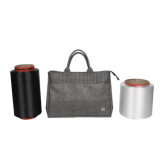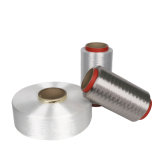Advanced Textiles, Markets | July 1, 2023 | By: Debra Cobb
Where would we be without polyester? Fibers created from polyethylene terephthalate (PET) are ubiquitous in our apparel, home furnishings, automotive, filtration and personal care industries. In 2021, they represented 57.57% of the global fiber market, according to Fibre2Fashion’s market insight tool TexPro. Industrial Filament

Yet the need for more-sustainable textiles, combined with a volatile supply chain for petroleum-based materials, may threaten polyester’s dominance. Fibre2Fashion estimates polyester’s market share will decline to 56.36% by 2025, amid “a sweeping change in share and size” for the global textile market.
Recycled polyester (rPET) fiber, created primarily from postconsumer PET beverage bottles, has emerged as the so-called “sustainable” choice for much of the textile industry, and rPET fibers are estimated to comprise 14% of the polyester fiber market. The 2025 Recycled Polyester Challenge, created in 2021 by the Textile Exchange and the United Nations Framework Convention on Climate Change, calls on manufacturers and brands to commit to raising their level of recycled polyester to 45% or higher by 2025, requiring some 17.1 metric tons (37,699 pounds) of rPET.
However, rPET is also in demand for making new bottles and food containers, setting up a potential battle between the beverage industry and textile manufacturing. Beverage companies are targeting 25% rPET content in their bottles by 2025.
According to Alasdair Carmichael, program director for the National Association for PET Container Resources (NAPCOR), there will not be enough rPET from bottles to meet both targets. “The only way to achieve 17.1 metric tons of rPET for fibers is to develop a much more effective textile recycling process, and this has to start with collection and separation—and then the development of either mechanical or chemical recycling processes.”
Separating and recycling textile waste to use as feedstock, as opposed to relying solely on the recycling of PET bottles, would help meet market demand. The EU has already legislated the separate collection of waste textiles, beginning in 2025.
“I think that the textile industry has to figure out how to do closed-loop recycling, since bottle companies will demand their bottles back,” says Laura Murphy, research director, fibers, for Wood Mackenzie Chemicals. “These bottle wars will not end well for fiber companies.”
Unifi Inc., a global manufacturer of synthetic and recycled performance fibers, has transformed more than 35 billion plastic bottles into rPET for textiles through its REPREVE® technology. The company recently announced a major expansion of its Textile Takeback™ program, which collects and recycles polyester-based fabric waste, including both pre- and postconsumer fabrics, and turns it into REPREVE fiber, creating a closed-loop circular system.
“While postconsumer packaging-based rPET is of undeniable importance, fiber-to-fiber circularity is a key element in the future of sustainable textiles,” says Meredith Boyd, senior vice president of sustainability, technology, and innovation at Unifi.
“Postconsumer-based rPET to rPET recycling is an accessible operation for the industry given present infrastructure,” Boyd says. “However, we look forward to seeing the progress of fiber-to-fiber developments, including attention at all points of the value chain for designing for recyclability. Additionally, we anticipate the advancement and scaling of new polymers and materials that are compatible with current and future recycling technologies to ensure that we are always designing for circularity.”
With the packaging industry gobbling up the rPET supply and fiber-to-fiber circular manufacturing still in its infancy, there’s a need for alternative polymers that are bio-based, recyclable and/or biodegradable.
Sorona®, a textile fiber also known as Triexta or PTT (polytrimethylene terephthalate), was developed by DuPont more than 20 years ago. Partially bio-based, the polymer is made from 37% 1,3-propanediol (PDO) created from plant sugars via fermentation. In June 2022, DuPont Biomaterials was acquired by the Huafon Group and is now known as CovationBio™. Sorona is one of the commercial brands that transitioned to the new organization. The top uses for Sorona fiber are carpeting and apparel, and Sorona can be mechanically recycled as part of the PET recycling stream, according to Mike Saltzberg, CEO for CovationBio.
“When designers are choosing materials or fibers, they look carefully at the technical performance as well as the sustainability profiles of each product. Sorona fibers offer vastly different technical performance than fibers made from PET, either virgin or rPET. Sorona is softer, can be used to create durable stretch or shape memory fabrics, and is more inherently stain resistant than PET,” says Saltzberg.
“As brands look for solutions to bring out more sustainable offerings, we think both rPET and Sorona can play a significant role, sometimes in the same fabric,” he adds. “One of the most exciting applications of Sorona that has been developed is a bicomponent stretch fiber made from a combination of Sorona and rPET. This recyclable fiber provides excellent stretch and recovery and can be used to replace non-recyclable spandex in many stretch fabrics.”
Fully bio-based. The development of fully bio-based polyethylene furanoate (PEF), a fiber that offers comparable properties to PET, is being led by Avantium, a Dutch technology company working in renewable chemistry. The company’s YXY® plant-to-plastics technology catalytically converts plant-based sugars into furandicarboxylic acid (FDCA), the key building block for PEF. These yarns can be produced on existing spinning and texturing lines. It is also medium-term degradable and can be recycled in existing PET waste streams.
Along with five global textile companies and brands, Avantium has formed the PEF Textile Community, which is currently developing textiles for a number of applications. The company recently signed an offtake agreement with Danish textile maker Kvadrat to create PEF-based textiles for both commercial and residential interiors. A commercial plant for PEF is under construction in the Netherlands, with large-scale production planned for 2024.
Food versus fiber. Another type of bio-based and compostable plastic, polybutylene succinate (PBS), is being developed by Brooklyn, N.Y.-based Kintra Fibers Inc. using monomers created from the fermentation of sugars derived from wheat, corn and the like. The company has produced yarn for apparel brand Pangaia and has pilot programs with other brand partners.
PBS is tunable and can be spun on the same equipment used for PET. While it performs similarly to polyester and nylon, it biodegrades in industrial composting environments.
“This year will be focused on developing fabric,” says co-founder and CEO Billy McCall. “We are making formulation tweaks aimed at efficiency—yarn properties such as strength, dyeability, stretch.”
McCall is aware of the food versus fiber criticism, countering, “We have a feedstock strategy. There is no perfect feedstock. We are rooted in performance first. The biggest issue is the switch from petrochemical fossil fuels.”
While change is in the air, it will take collaboration and innovation to bring an end to fossil fuel-based polyester in our lifetime. “We believe that it will take a multitude of technological solutions to make textiles more sustainable in the future; no one technology will be a ‘silver bullet,’” says Saltzberg.
Biopolymers may serve as polyester alternatives, but they won’t come cheap. In transition, legislation that establishes bottle recycling as a revenue stream and requires separation of textile waste for closed-loop textile-to-textile recycling would go a long way toward increasing the supply of recycled polyester fiber.
Debra Cobb is a freelance writer with expertise in the textiles industry. She is based in North Carolina.
HeiQ AeoniQ™ is a cellulosic filament yarn made from renewable sources such as cigarette butts, coffee grounds, banana peels and other non-valorized waste or from recycled natural fibers like Circulose® from Renewcell. The innovative Swiss company HeiQ uses a gentle, pH-neutral chemistry that homogenizes the cellulose, allowing it to be spun as a continuous filament with the elongation and tenacity of polyester. The first commercial HeiQ AeoniQ garment, a seamless high-performance polo shirt, was launched by the German brand Hugo Boss in January.
Carmen Danner, director of business development for HeiQ AeoniQ, calls the fiber “the revolutionary solution to one of the textile industry’s biggest problems. Our main objective is to render polyester obsolete and eliminate any investments in fossil fuel-based fibers by 2035. We wholeheartedly believe that HeiQ AeoniQ is the only viable solution to achieve this objective.”
Printed, flexible electionics for e-textiles
The glamping boom is good business for tent manufacturers
AI’s potential in saving manufacturers time and money
Industry advocacy efforts keep textile business in the U.S.
Sleep apnea textiles balance comfort and technology
Specialty Fabrics Review is a publication of the Advanced Textiles Association
Copyright © 2024 Advanced Textiles Association. All rights reserved.
1801 County Road B W, Suite 100 Roseville, MN 55113-4052, USA

Polyester Ring Spun Yarn Terms of Service Privacy Policy